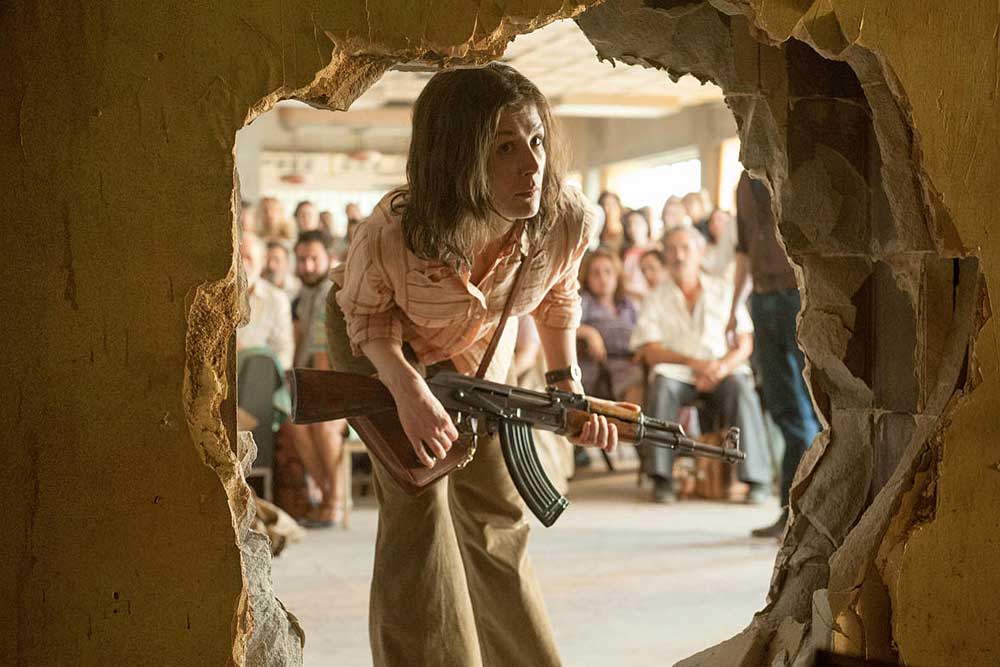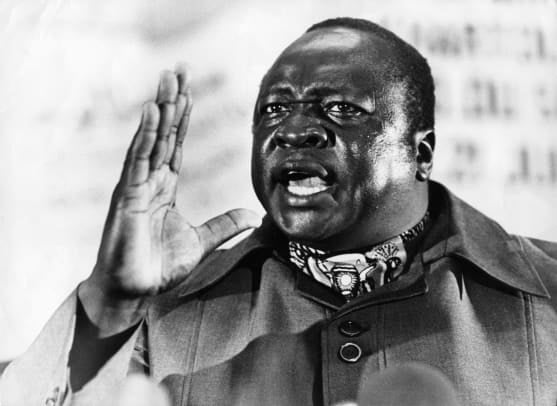
By Emad El-Din Aysha, PhD
Typically for me, after watching and debunking The Angel (2018), I couldn’t help but watch 7 Days in Entebbe (2018) by a director I really do not like, José Padilha, on account of the mess he made with the Robocop (2014) remake. I thought, mistakenly, that this was another Israeli movie pouring yet more vinegar on open wounds. I was more than pleased to be proven wrong!
The Art of Reading Backwards
It wasn’t a great movie, mind you. Just ‘good’. I prefer the older TV movie Victory at Entebbe (1976) personally, which I’d watched when I was a toddler, ironically, in Kuwait in the 1980s. (It’s been said that the plot to hijack the plane was concocted in Kuwait by Palestinian factions). José Padilha’s movie is exquisitely shot and very well written with an interesting cast and very deep performances, and gorgeous music, but it’s too artistic for its own good. It ends up being uninvolving, as tense as it is. The sharp cinematography gets in the way of making the story ‘feel’ like it’s happening in the 1970s, when cameras and TV transmissions were more blurry.
The movie is a creature of its times, which makes it too retrospective, such as in the cabinet meeting scene where the defence minister Shimon Peres is complaining about the defence budget not being big enough while the Prime Minister insists more money should be diverted into education and culture, investing in the future. That sounds too much like a reference to the post-9/11 world and American foreign policy. (The torture scene at Entebbe airport also feels like a jibe at the 9/11 world). The cabinet scene in the 1976 movie is more convincing, starring Anthony Hopkins as the PM Rabin, and not only are their haircuts and loudly coloured clothing more accurate, what they’re talking about in that scene was more true to the times as well. Namely, the illegal settlements being built by Israelis in the West Bank and Gaza, a still relevant issue, if not the relevant issue. Alas, no mention is made of them in the new movie.
The focus in the older movie was roundly on the hostages, with a multitude of personal stories and humorous incidents, which is wise even from a movie-going perspective because it breaks the tension. (They actually tell you that in the movie, with reference to the kosher chocolates sequence). The actors were too American-looking but they were easier to relate to. The military operation and intelligence side of it was also bigger and more accurately portrayed (I presume), amazingly enough.
From a political point of view, however, the new movie comes out winning. The 1976 movie is far too naïve. It’s not entirely one-sided, with some Palestinian characters voicing their side of the story, and quite convincingly, but the whole thing is told with a WWII-frame of reference. In José Padilha’s hands the narrative is focused on the hijackers. The German duo, played very competently by Daniel Brühl and spectacularly by Rosamund Pike, put the lie to the supposed anti-Semitism of what took place. I liked Helmut Berger more personally in the old movie, but there’s a scene in the 2018 movie where Rosamund Pike’s making a long distance phone call to her lover and is confessing the mistake she made in coming here, and then you discover the phone doesn’t work!
I’ve always thought that Rosamund Pike is a great actress, and not just a beautiful, posh and sexy one. She proves it here, almost walking in a daze in that sequence. I expect even greater things from her from now on. (The dark hair was a nice touch too, making her look less steely and more complicated. The scene where she cuts her hair indicates that she knows she’s going to die, in imitation of her friend who cut hr hair before committing suicide in prison).

There’s also a great scene where one of the Palestinians tells Daniel Brühl’s character:
"You choose to come here. You could have a nice life in Europe. I wish I had your life. I would not pick up a gun. Only people with nothing understand. The Jews understand. When your people massacred them, the ones who survived had nothing. They brought their dead to Palestine. They brought their shame and humiliation. They did what was done to them to us. But I didn’t do it to them. You did it to them. You are here because you hate your country. I’m here because I love mine."
No wonder the movie has garnered the wrath of many an Israeli movie buff. A more astute observer would have noticed that even the old movie has little ‘hints’ in it. One of the hostages is a tank commander from the Golan and is always trying to get the others to take action against the hijackers, and he gets himself killed during the rescue mission, getting up when he shouldn’t have. In another scene he sees people whom he thinks are Israelis but they turn out to be Palestinians, and he insists you can tell the difference. The other one who gets gunned down by the Israelis is a young man who was checking on his sweetheart, who was played very nicely by Linda Blair, the girl from The Exorcist amazingly enough!
Richard Dreyfuss as Yonni Netanyahu, the ‘only’ commando to get killed in the operation, is also a peacenik at heart and voices his concerns about this never-ending war with the Arabs. (There’s hints about who is exactly in charge, the military or the elected government, a point made more explicitly in the new movie). The character of German hijacker Wilfried Böse in both the old and the new movie refuses to kill the hostages when the Israeli raid begins, and that seems to be a historical fact according to Israeli accounts.
One of the strong points, and not just artistically, of the new movie is the performance of the Batsheva Dance Company. It’s meant to highlight this whole trade-off between culture and war, since one of the commandos has a (tall, redhead) girlfriend in the dance team and he can’t be with her on account of his duties. (The actress, Zina Zinchenko, is originally Russian, which would explain her considerable dance skills). It strains their relationship and he’s told by his superior (Yonni again) to only have a girlfriend in the military to avoid a breakup. When the girl in question is rehearsing, the trainer tells her she isn’t committed enough. If she wants to perform with them, she has to take that ‘leap of faith’ and not be afraid of falling down, an obvious message to those in Israel who don’t want to take a risk on peace.
More important still is the closing sequence, with a surrealistic dance performance, where a male dancer is moving along a straight line, with a face made up like a mask, dangling his arms and legs like a puppet. In the background there is a female dancer who is running and running, without going anywhere, like the Red Queen in Alice in Wonderland. (The dancer has red hair, just like Zina Zinchenko’s).
When the dancer tells her boyfriend to leave active service, she says: “If you think you have no choice, you’re a hostage, too.” That highlights the corner the Israelis have pushed themselves into, which is why you are told at the end that there are no longer any peace negotiations and that Rabin was killed by a Jewish fanatic opposed to the peace process, while the hardliner Peres himself learned from Rabin. (A similar hint is given about Rabin in the Anthony Hopkins performance).
The Second-Hand Strikes Back
You felt like the director knew he was walking into a minefield, hence the star-studded cast, even in the smaller roles. You had Denis Ménochet playing the co-pilot onboard the plane, who is also an engineer, and he tries to talk Wilfried Böse out of the operation. Denis Ménochet, if you must know, was in Inglourious Basterds, the French Diary farmer who betrayed the Jewish family in the opening sequence. The actual pilot of the Air France plane, who played a heroic role in the original hijacking, is given a lesser role here, played by Brontis Jodorowsky. (Both actors have very pasty blue eyes).
In the 1976 movie the pilot was played by the militarist Christian Marquand. I say militarist because he was in a deleted scene in Apocalypse Now (1979) playing a French colonial officer who wouldn’t leave Vietnam. As for Brontis Jodorowsky, he was originally set to be the martial arts extravaganza of Jodorowsky’s Dune, playing the very young Paul Atreides.
But that’s enough artistic pussyfooting. Now to get the actual Entebbe operation. What ‘exactly’ took place?

My only knowledge of what happened was from that 1976 movie, as I said above, and a book I came across when I was at school in England, a kind of novalised version of the real story. Then I chanced on Richard Deacon’s offensive book about Israel’s intelligence service. Some weird facts popped up. One was that the Entebbe airport was actually built by the Israelis themselves and that Idi Amin was originally their man in Uganda, till he ‘turned’ on them for some reason and brought the Palestinians in as replacements. No wonder the Israelis were able to launch such a successful operation, they knew the place inside out because it was theirs all along!
Another troubling fact concerned the death of Colonel Yonatan ‘Yonni’ Netanyahu. I was always led to believe that he was shot by a Ugandan from the airport watchtower, but Mr Deacon says he was killed in a crossfire. Mr Deacon also shed doubt on the whole black Mercedes the Israelis used to make everyone think Idi Amin was making an entrance. He also said the Israelis weren’t terribly flustered by the news of the Air France plane going missing because they’re trained for this kind of thing beforehand. Why would such a pro-Israeli author say such things and so many years after the event, when everything has supposedly become known? Looking back on it, even the novelised version I’d skimmed through was full of things that didn’t make sense. Hmmm.
Reading yet another second-hand book, 90 Minutes at Entebbe (July 1976) by the even more offensive William Stevenson – he hates Arabs and Africans and openly harks back to the good old days of white colonialism – didn’t solve any riddles.[1] It actually added more, such as exactly how the two Germans hijackers got killed (Wilfried Böse and Brigitte Kuhlmann). In the book they’re taken by surprise by the Israelis, inside the terminal, which doesn’t square with the standard accounts. The author talks about somebody seeing black smoke rising above the airport, from a safe distance, but that makes no sense because the lights at Entebbe were turned off as soon as the firing started. There’s also the matter of the explosive the Palestinians had supposedly wired the place with, hidden in the cardboard boxes. (In the old movie they explain how they figured out this was a façade, but this still hasn’t been settled in the books published on the operation and it still hasn’t to this day, with Shimon Peres bragging about how they went in ‘blind’). There’s also the fact that Yonni couldn’t use his left arm (according to Stevenson) from an old war injury, which would make leading an attack like this, and actually fighting (holding a gun with both hands) a tad bit difficult.
There’s also how the Israelis were able to fly to Uganda undetected, even though the Soviets had radio and radar outposts in the region. Speaking to a Sudanese friend, without naming names, he wasn’t too surprised. He told me that Sudan’s president Numari actually smuggled Falasha Jews from Ethiopia to Israel, by plane, which would indicate some form of cooperation in this enterprise. (Kenya certainly cooperated, with intelligence and refuelling). And it stretches credulity to think that the Israelis had to search through their documents to find out what Palestinian groups were in Uganda after the hijacking. It’s not like they don’t keep tabs on all these groups already, and that they somehow didn’t have an intelligence presence in Uganda after being there all this time. (It’s hard to believe they didn’t have operatives aboard the plane among the hostages, if not the kidnapers, to be honest).
Well, new ‘material’ has been revealed in the new century, prompting Justin Raimondo of Antiwar.com to condemn the Entebbe operation as a setup, meant to win international sympathy for Israel and – more importantly – scuttle attempts being made by PLO, France and the United States to liberate Palestine on the 1967 borders.[2] A BBC news item, citing the same declassified documents, says:
… DH Colvin of the Paris Embassy writes of his Euro-Arab Parliamentary Association source: “According to his information, the hijack was the work of the PFLP, with help from the Israeli Secret Service, the Shin Beit.
“The operation was designed to torpedo the PLO’s standing in France and to prevent what they see as a growing rapprochement between the PLO and the Americans.”
… He adds: “My contact said the PFLP had attracted all sorts of wild elements, some of whom had been planted by the Israelis.”
The documents also revealed a “report from another British official citing a reporter for the Liverpool Post, Leo Murray, whose inside sources confirmed the hijacking was all about internal Palestinian politics, at least from the PFLP’s perspective.”
Raimondo even compares Entebbe to the Lavon Affair. Pretty much says it all, doesn’t it!
A Scissors and Paste Continent
Well, according to Stevenson, the Israelis can’t afford to lose a single battle so failure here would be a disaster. Why? Because if Israel can’t protect Jews, the Israelis themselves will start packing their bags and heading elsewhere.
The obsession with decorum is clearly evident in the movie, with defence minister Shimon Peres (played to conniving perfection by Eddie Marsan) discussing the crisis while having his teeth checked at the dentist’s. To be honest, even in the 1976 movie, Rabin justifies this long-distance operation by saying it will be the first thing to give the Israelis a sense of hope following the 1973 War. Nothing like a turkey shoot to lift up your spirits, it seems. Now let’s take a second look at Uganda. What were the Israelis doing there to begin with and why did Idi Amin get angry at them all of a sudden. Speaking to an amateur historian friend, he told me that Uganda had actually asked to join Egypt at the time of the monarchy, and King Farouk in his infinite daftedness refused. He added that the Zionists were originally earmarked to go to Uganda, which would explain why the Israelis were so keen on helping feed Amin’s megalomania.
Here’s another historical snippet. I was once in a sweet shop – I like gateaux, okay – and overheard a customer talking about his times in Israel. He was an Egyptian Jew who’d migrated, and he added that the only reason the Jews didn’t head off to Uganda was that it was a landlocked country. Without access to the sea, the Jews couldn’t make a run for it if the people ganged up on them!

Could it be the Israelis were making a ‘second’ country? It’s not as farfetched as it sounds. South Africa is a white colony and the Israelis have never been satisfied with their lot in life. Palestine doesn’t nearly have enough water, let alone oil. (Oh, Mr Stevenson says that Israeli paratroopers are regularly trained to seize airfields and “oil wells” in the event of an all-out war; pp. 75). Uganda is connected to the Nile, so can help put pressure on Egypt, and Herzl was open about his desire to get at excess Nile water. It has a temperate climate and could serve as an emergency fallout shelter if Israel proper went belly-up. The only catch is access to the sea, but I’m pretty sure the Israelis could take care of that. Thanks heavens Idi Amin Dadda, crackpot that he was, was paranoid as hell. He may have seen it coming and so booted them out and switched to their arch enemies, the Palestinians, in the nick of time.
Well, either that or the Palestinians planted that idea in his head, learning to think like Israelis themselves and hijack a country to their interests. (Bin Laden did that in Afghanistan). Only time will tell.
In the meantime, we’ve really got to start reading more, as Arabs. Imagine that, remembering something you read in the school library to chase out inconsistencies in the official storyline 20 odd years later. Reading, it almost sounds like ancient history!!!
NOTES:
[1] Stevenson also buys into the image of the Israelis being on the frontline of the Cold War, holding back Soviet expansion and just how dangerous Russians were in the battlefield (pp. 138). He actually berated them for going over and above the call of duty, stealing Soviet technology and getting it to the West. Remember what I said about that atrocious novel, The Formula?!
[2] Please Justin Raimondo, “UNHOLY ALLIANCE: THE MYTH OF ENTEBBE & ISRAELI FALSE-FLAG OPERATIONS”, (July 09, 2007), http://rockthetruth.blogspot.com/2007/11/israels-false-flag-entebbe-operation.html and https://original.antiwar.com/justin/2007/07/09/unholy-alliance/.





